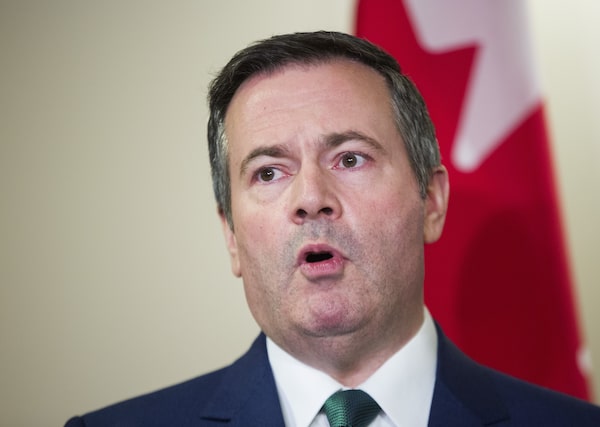
Alberta Premier Jason Kenney, seen here on Jan. 7, 2020, is crying wolf.Todd Korol/The Canadian Press
Alberta Premier Jason Kenney’s response to the federal cabinet’s possible thumbs-down to the launch of Teck Resources’ monster Frontier oil sands mining project has been nothing short of hysterical. Rejecting the $21-billion hole in the ground would bring Western alienation to “boiling point,” he said earlier this week, and have “devastating impacts” on the Albertan and Canadian economies.
Here’s what will really happen if Frontier dies on the drawing board: pretty much nothing.
The project is unlikely to go ahead even if it is approved. If it is not approved, 20 other oil sands projects that have already been approved can still go ahead.
Cabinet will make some sort of decision by the end of February. There are four options. Cabinet can approve the project as pitched by Teck; it can turn it down outright; it can delay a decision while it seeks more information on the project’s environmental impact and other matters; or it can give Teck the green light subject to certain new conditions that, depending on their severity, may kill the project.
Various reports suggest that the Liberal backbench – Alberta is devoid of Liberal MPs – is largely opposed to the Frontier project. Cabinet is thought to be more or less evenly divided. It is not known which way Environment Minister Jonathan Wilkinson is leaning, though Frontier’s hefty carbon footprint certainly worries him. “The issues around greenhouse gases associated with the project are absolutely relevant to the decision that the federal cabinet will need to take,” he told The Globe and Mail in December at the Madrid climate change conference.
Mr. Wilkinson and the cabinet face a difficult, even momentous, decision that will carry enormous national and international implications. There is no win-win here.
A decade ago, even five years ago, Frontier would probably have faced far less resistance from MPs and voters, though Indigenous and environmental groups always would have had grave concerns, given the sheer size of the project and its unfortunate proximity to Wood Buffalo National Park in northeast Alberta, a UNESCO world heritage site.
What has changed in recent years is the intensity and awareness of climate change and the realization that Earth is on course for catastrophe – droughts, famines, wildfires, flooding, mass migration, unbearable temperatures – unless rapid decarbonization is pursued, preventing average global temperatures from rising beyond 2 C over pre-industrial levels. Every week, more evidence emerges that the climate is changing fast. In recent days, record temperatures, as high as 20.75 C, have been recorded in the Antarctic. January saw the warmest-ever average global temperatures, according to the U.S. National Oceanic and Atmospheric Administration.
Under the Stephen Harper administration, the oil sands players had licences to expand at will and stuff as much carbon into the atmosphere as they wanted – he pulled Canada out of the Kyoto Protocol, the early United Nations treaty that committed countries to reduce greenhouse gas emissions. The free ride has changed under Justin Trudeau’s Liberals. Canada has an effective national carbon tax and has committed to reduce emissions by 30 per cent over 2005 levels by 2030 and reach net zero by 2050.
Both goals are highly ambitious and probably unachievable. But that’s not the point. The point is that Canada made them and approving Frontier would make the target harder to achieve while blowing Canada’s image as a country that wants to be part of the climate solution after many decades of working hard to be part of the problem. Frontier would produce 260,000 barrels a day – almost 10 per cent of current oil sands output – cover 24,000 forest-chewing hectares and pump out four million tonnes of greenhouse gases a year for four decades.
Earlier this month, in an effort to dab some green on the Frontier project, Teck revealed a goal to achieve carbon neutrality by 2050, across the whole company. But the announcement was too vague to carry much punch. There were no details on milestones, or how the pledge would actually affect Frontier. Teck wants to bring in a partner. What if the partner doesn’t make the same pledge? If Frontier itself is to reach net zero, would Teck even be able to recruit a partner?
As it stands, Frontier is almost certainly a non-starter at current oil prices. Teck was assuming prices would be US$90 a barrel or greater when it was planning the project. On Friday, the price for Brent crude was just above US$57.
Mr. Kenney is crying wolf. Rejection of a project that can’t go ahead unless oil prices are sustainably higher, and can’t go ahead unless it finds a partner and is connected to pipelines, will hardly devastate the Alberta economy. If cabinet does kill Frontier, there are 20 other projects that can still get built. Collectively, they are equivalent in output to 10 Frontiers.
For sure, killing Frontier wouldn’t help east-west relations. But approving it would certainly damage Canada’s standing on the international climate stage. Mr. Wilkinson has to attend a crucial climate conference in Glasgow in the fall. His credibility would be shot if he arrived to find a sea of anti-Frontier protesters.
Mr. Wilkinson and the rest of cabinet cannot win on the Frontier file. But given the powerful evidence of radical climate change, and Mr. Trudeau’s apparent desire to bury Canada’s grubby climate past, the least awful option is to kill Frontier and let Mr. Kenney make up dubious stories about economic destruction. There won’t be any. Alberta can still have have its oil sands expansions – if the oil price is right.
 Eric Reguly
Eric Reguly